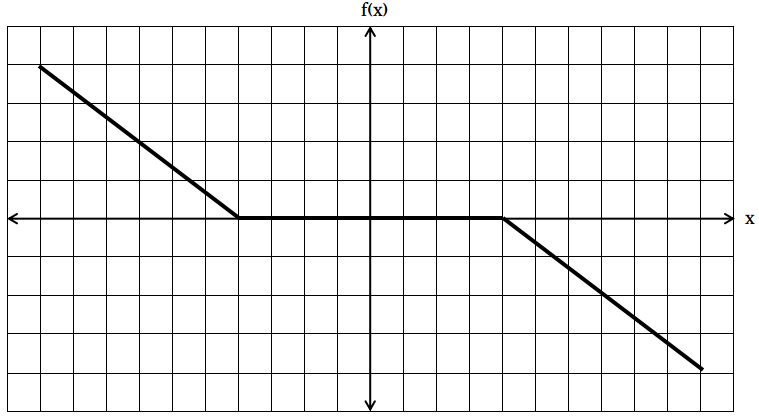CAT 2000 Question Paper
Directions for the next 3 questions:
Given below are three graphs made up of straight-line segments shown as thick lines. In each case choose the answer as:
a) if f(x)=3f(-x)
b) if f(x)= -f(-x)
c) if f(x) = f(-x)
d) if 3f(x) = 6f(-x), for x >= 0
CAT 2000 - Question 121
CAT 2000 - Question 122

Directions for the next 2 questions: There are three bottles of water, A, B, C, whose capacities are 5 litres, 3 litres, and 2 litres respectively. For transferring water from one bottle to another and to drain out the bottles, there exists a piping system. The flow through these pipes is computer controlled. The computer that controls the flow through these pipes can be fed with three types of instructions, as explained below:

Initially, A is full with water, and B and C are empty.
CAT 2000 - Question 123
After executing a sequence of three instructions, bottle A contains one litre of water. The first and the third of these instructions are shown below:
First instruction: FILL (C, A)
Third instruction: FILL (C, A)
Then which of the following statements about the instruction is true?
CAT 2000 - Question 124
Consider the same sequence of three instructions ‘and the same initial state mentioned above. Three more instructions are added at the end of the above sequence to have A contain 4 litres of water. In this total sequence of six instructions, the fourth one is DRAIN (A). This is the only DRAIN instruction in the entire sequence. At the end of the execution of the above sequence, how much water (in litres) is contained in C?
Directions for the next 2 questions:
For a real number x, let
$$f(x) = 1/(1+x),$$ if $$x$$ is non-negative
$$f(x) = 1+x,$$ if $$x$$ is negative
$$f^n(x) = f(f^{n-1}(x)), n = 2, 3.....$$
CAT 2000 - Question 125
What is the value of the product, $$f(2) f^2(2)f^3(2) f^4(2)f^5(2)$$?
CAT 2000 - Question 126
r is an integer 2. Then, what is the value of $$f^{r-1}(-r) + f^r(-r) + f^{r+1}(-r)$$?
For the following questions answer them individually
CAT 2000 - Question 127
Let D be recurring decimal of the form, $$D = 0.a_1a_2a_1a_2a_1a_2...$$, where digits $$a_1$$ and $$a_2$$ lie between 0 and 9. Further, at most one of them is zero. Then which of the following numbers necessarily produces an integer, when multiplied by D?
CAT 2000 - Question 128
 In the above table, for suitably chosen constants a, b and c, which one of the following best describes the relation between y and x?
In the above table, for suitably chosen constants a, b and c, which one of the following best describes the relation between y and x?
CAT 2000 - Question 129
If $$a_1 = 1$$ and $$a_{n+1} = 2a_n +5$$, n=1,2,....,then $$a_{100}$$ is equal to:
CAT 2000 - Question 130
What is the value of the following expression?
$$\dfrac{1}{(2^2-1)}+\dfrac{1}{(4^2-1)}+\dfrac{1}{(6^2-1)}+...+\dfrac{1}{(20^2-1)}$$
Two Factor Authentication
Incase of any issue contact support@cracku.in





